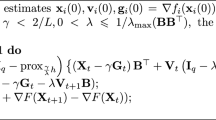Abstract
This paper studies the consensus of switched multi-agent systems (MAS) with binary-valued communications. Different from the existing studies on switched MAS considering precise observations, each agent studied in this research only receives binary-valued information with stochastic noises from its neighbors’ states. Further, unlike the existing studies on MAS with binary-valued information in a fixed topology, in this paper, we consider the jointly connected undirected graphs, each of which switches with non-zero probability. The consensus algorithm comprises of two stages: first, the connected agents employ a recursive projection algorithm to estimate their neighbors’ states based on the binary-valued communications; second, the control law of the connected agents is developed based on the estimations to upgrade their states. It is proved that both the speed of the estimation convergence to the real states and the consensus speed of the states can achieve O(1/t) when the iteration step is given a proper value. Furthermore, the results indicate that the larger the value of the lowest probability that a graph emerges with, the more easily the consensus could be achieved. Finally, a simulation is presented to demonstrate the theoretical analysis.
Similar content being viewed by others
References
Su H, Wang X, Yang W. Flocking in multi-agent systems with multiple virtual leaders. Asian J Control, 2008, 10: 238–245
Chen Z, Huang Y, Li D, et al. Distributed adjacency weight design for second-order consensus in wireless sensor and actuator networks. Asian J Control, 2017, 19: 1365–1374
Kar S, Moura J M F. Distributed consensus algorithms in sensor networks: quantized data and random link failures. IEEE Trans Signal Process, 2010, 58: 1383–1400
Bhatta P, Leonard N E. Stabilization and coordination of underwater gliders. In: Proceedings of the 41st IEEE Conference on Decision and Control, Las Vegas, 2002. 2081–2086
Blondel V D, Hendrickx J M, Olshevsky A, et al. Convergence in multiagent coordination, consensus, and flocking. In: Proceedings of the 44th IEEE Conference on Decision and Control, Seville, 2005. 2996–3000
Li T, Zhang J F. Mean square average-consensus under measurement noises and fixed topologies: necessary and sufficient conditions. Automatica, 2009, 45: 1929–1936
Lu K H, Jing G S, Wang L. Distributed algorithms for solving the convex feasibility problems. Sci China Inf Sci, 2020, 63: 189201
Duan G P, Xiao F, Wang L. Hybrid event- and time-triggered control for double-integrator heterogeneous networks. Sci China Inf Sci, 2019, 62: 022203
Wang T, Zhao Y L. Identification, control and application of set-valued system. J Nanjing Univ Inf Tech Sci Edition, 2017, 9: 319–325
Jing L D, Zhang J F. Tracking control and parameter identification with quantized ARMAX systems. Sci China Inf Sci, 2019, 62: 199203
Wang T, Zhang H, Zhao Y. Average consensus of multi-agent systems under directed topologies and binary-valued communications. IEEE Access, 2018, 6: 55995–56006
Zhao Y, Wang T, Bi W. Consensus protocol for multiagent systems with undirected topologies and binary-valued communications. IEEE Trans Automat Contr, 2019, 64: 206–221
Wang T, Zhao Y, Wang X. Consensus algorithm of multi-agent system with binary-valued communication. In: Proceedings of the 10th Asian Control Conference, Sabah, 2015. 1–6
Guo J, Zhao Y. Recursive projection algorithm on FIR system identification with binary-valued observations. Automatica, 2013, 49: 3396–3401
Wang T, Hu M, Zhao Y. Convergence properties of recursive projection algorithm for system identification with binary-valued observations. In: Proceedings of the China Automation Congress, Xi’an, 2018. 2961–2966
Wang T, Zhang H, Zhao Y. Consensus of multi-agent systems under binary-valued measurements and recursive projection algorithm. IEEE Trans Automat Contr, 2020, 65: 2678–2685
Lee T C, Xia W, Su Y, et al. Exponential consensus of discrete-time systems based on a novel Krasovskii-LaSalle theorem under directed switching networks. Automatica, 2018, 97: 189–199
Jadbabaie A, Lin J, Morse A S. Coordination of groups of mobile autonomous agents using nearest neighbor rules. IEEE Trans Automat Contr, 2003, 48: 988–1001
Li T, Xie L H. Distributed consensus over digital networks with limited bandwidth and time-varying topologies. Automatica, 2011, 47: 2006–2015
Zhang Q, Zhang J F. Quantized data-based distributed consensus under directed time-varying communication topology. SIAM J Control Optim, 2013, 51: 332–352
Li D Q, Liu Q, Wang X, et al. Quantized consensus over directed networks with switching topologies. Syst Control Lett, 2014, 65: 13–22
Zhang X D. Matrix Analysis and Applications. 2nd ed. Beijing: Tsinghua University Press, 2013
Huang M, Manton J H. Stochastic Lyapunov analysis for consensus algorithms with noisy measurements. In: Proceedings of the American Control Conference, New York, 2007. 1419–1424
Evans L C. An Introduction to Stochastic Differential Equations. Providence: American Mathematical Society, 2012. 82
Acknowledgements
This work was supported in part by National Key R&D Program of China (Grant No. 2018YFA0703800), National Natural Science Foundation of China (Grant Nos. 61803370, 61622309), and China Postdoctoral Science Foundation (Grant No. 2018M630216).
Author information
Authors and Affiliations
Corresponding author
Rights and permissions
About this article
Cite this article
Hu, M., Wang, T. & Zhao, Y. Consensus of switched multi-agent systems with binary-valued communications. Sci. China Inf. Sci. 65, 162207 (2022). https://doi.org/10.1007/s11432-020-3052-0
Received:
Revised:
Accepted:
Published:
DOI: https://doi.org/10.1007/s11432-020-3052-0




